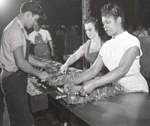
Labor and the Automobile in American Life and Society
Over the last generation, American auto workers have absorbed bad news about plant closings, layoffs, and the “outsourcing” of jobs to foreign countries. Indeed, by 2008, General Motors will employ only about as many blue-collar workers in the U.S. as it used to employ during the 1970s in Flint, Michigan, alone. But the history of labor relations in the automobile industry is more than a tale of hiring and firing—it’s also the history of American manufacturing and of the changing notion of what work itself is.
In his essay on “The Degradation of Work,” Stephen Meyer examines this history, demonstrating in detail the ways auto production has transferred skill from workers to machines—and the ways workers have dealt with or sought relief from their monotonous, exhausting tasks. In his second essay, Meyer takes a closer look at the introduction of automated machinery to Ford’s Brook Park Plant near Cleveland during the 1950s. Drawing on both union and company documents, Meyer shows that seemingly trivial arguments about the definitions of job titles and descriptions of job tasks were in fact large debates about the future of the auto industry and its workers.
About the Project | Credits | Contact Us | Student & Teacher Resources | Site Map
©2004-2010 Automobile in American Life and Society
